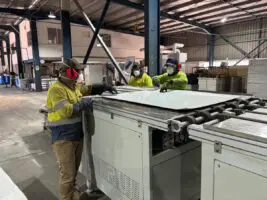The federal Coalition’s bid to scrap the Gillard government’s Clean Energy Future package of bills stands on shaky ground today, with Labor and the Greens joining forces in the Senate in a bid to save two key climate bodies from being axed.
The two parties used their majority vote on Monday night to split the Abbott government’s package of repeal bills – originally 11 pieces of legislation set to go through as one – separating the legislation to end the carbon price from the bills to eliminate the $10 billion Clean Energy Finance Corporation (CEFC) and the Climate Change Authority (CCA).
The Senate will now debate the Coalition’s proposed scrapping of the CEFC and the CCA in separate repeal bills, starting with the CEFC later today.
Tony Abbott and Co. have long threatened to dump the CEFC, which they have variously described as tax payer-funded support of projects the private sector won’t touch, and as “a honeypot to every white-shoe salesman imaginable.”
Speaking at the 2013 Carbon Expo conference in Melbourne today, federal environment minister Greg Hunt reiterated this stance, describing the CEFC as “incredibly speculative” in its operation, and arguing that it displaces effective policies such as the Renewable Energy Target (which the government also happens to be reviewing). This is despite the meticulous rubbishing of such views by the CEFC in their written and spoken submissions to the Senate inquiry.
But Greens leader Christine Milne used her time at the Carbon Expo podium to reiterate her own party’s belief that Australia needs the CEFC and CCA, to co-finance crucial renewables growth and development, and to advise on climate policy to match the science.
Milne described the vote to split the repeal bills as an important victory for climate action. “We need to keep those institutions,” Milne told the audience gathered at the MCG. “There is no reason for getting rid of them, except for ideological spite.”
Milne described the CEFC as a “critical component” of building Australia’s renewable energy market, and the CCA as the premier institution to advise the government on setting an emissions cap, and vital to de-politicise the issue of climate change.
She accused the Coalition of being a party of “climate deniers”, and its Direct Action policy as “a sham”, pointing out that it can’t be scaled up.
“It is despicable of Minister Hunt to say Australia’s abatement task has been reduced because some of its industry has gone offshore,” Milne said. “It shows that you don’t get the science, or you do get the science and you’re totally irresponsible – one or the other.”
Aside from defending the scrapping of the clean energy and climate advisory bodies, Hunt, who spoke ahead of Labor climate spokesman Mark Butler and Milne, also ruled out extra regulation of power plants, in a speech focused on the Coalition’s Emissions Reduction Fund – a key plank of its Direct Action Policy.
Hunt – who told the crowd he thought Australia’s 5% emissions reduction target was more achievable now due to falling emissions and falling cost of abatement – said the ERF amounted to purchasing abatement, rather than “investing speculatively.”
Although only at Green Paper stage, the ERF is expected to provide $300 million in its first year, increasing each year to $500 million, $750 million and $1 billion.
As was noted, even in the La Trobe Valley Express in October, the price-competitive nature of the fund has some industry sources “concerned the capital intensive costs associated with retrofitting or upgrading power generators meant the industry could lose out to cheaper carbon abatement options in other sectors.”
Speaking at Carbon Expo, Labor’s Mark Butler was a little more blunt in his assessment, describing the ERF as “little more than a dressed up slush fund with a fancy name.”
In an eerily familiar-sounding refrain, Butler said it was of significant concern to the ALP that the fund was a waste of taxpayers’ money, to be spent on measures power companies were going to implement anyway.
But the final word went to Milne, who warned that, regardless of what happened with the Coalition’s repeal bills, Australia’s emissions trading scheme would come back – “and when it does, it will be much more stringent than it was.”
“The global emissions budget to keep us to 2°C is diminishing rapidly,” Milne said. “There are no choices here. …Think long-term, think much more stringent emissions budgets, and focus your business plans around this.”







